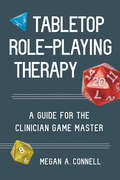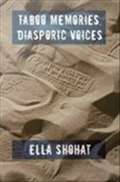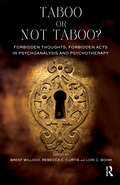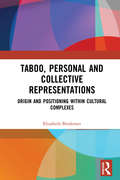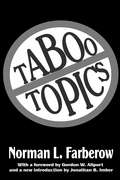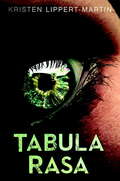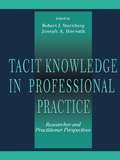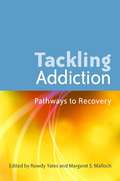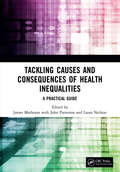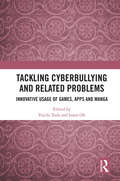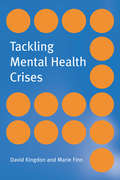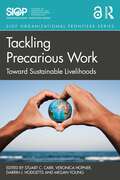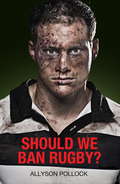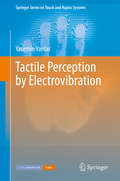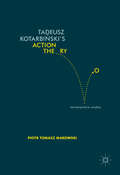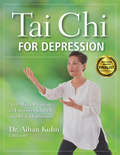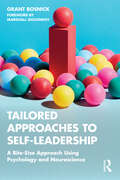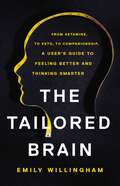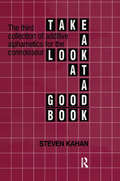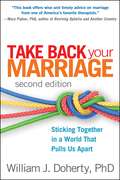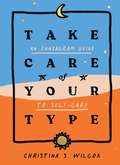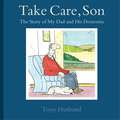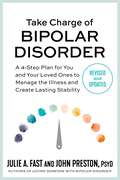- Table View
- List View
Tabletop Role-Playing Therapy: A Guide for the Clinician Game Master
by Megan A. ConnellA comprehensive book explaining “applied RPGs”—using role-playing games therapeutically. Across the globe, therapists are using tabletop roleplaying games (RPG) such as Dungeons & Dragons as a part of their practice. This book provides an overview of what RPGs are and what makes them such an effective and powerful tool for therapy. By examining research on gaming, flow, immersion, and role-play, readers will gain a better understanding of the theoretical underpinnings and how to skillfully and ethically use RPGs in their own practices. The author also looks at the history of RPGs, specifically focusing on issues of diversity and representation to help providers understand some possible pitfalls that exist within the medium. The book utilizes an example group to walk through everything from conception, planning, running, documentation, and termination of the group.
Taboo Memories, Diasporic Voices
by Ella ShohatTaboo Memories, Diasporic Voices brings together for the first time a selection of trailblazing essays by Ella Shohat, an internationally renowned theorist of postcolonial and cultural studies of Iraqi-Jewish background. Written over the past two decades, these twelve essays--some classic, some less known, some new--trace a powerful intellectual trajectory as Shohat rigorously teases out the consequences of a deep critique of Eurocentric epistemology, whether to rethink feminism through race, nationalism through ethnicity, or colonialism through sexuality. Shohat's critical method boldly transcends disciplinary and geographical boundaries. She explores such issues as the relations between ethnic studies and area studies, the paradoxical repercussions for audio-visual media of the "graven images" taboo, the allegorization of race through the refiguring of Cleopatra, the allure of imperial popular culture, and the gender politics of medical technologies. She also examines the resistant poetics of exile and displacement; the staging of historical memory through the commemorations of the two 1492s, the anomalies of the "national" in Zionist discourse, the implications of the hyphen in the concept "Arab-Jew," and the translation of the debates on orientalism and postcolonialism across geographies. Taboo Memories, Diasporic Voices not only illuminates many of the concerns that have animated the study of cultural politics over the past two decades; it also points toward new scholarly possibilities.
Taboo or Not Taboo? Forbidden Thoughts, Forbidden Acts in Psychoanalysis and Psychotherapy: Forbidden Thoughts, Forbidden Acts in Psychoanalysis and Psychotherapy (The\developments In Psychoanalysis Ser.)
by Lori C. Bohm'Psychoanalysis has, from its inception, been a discipline concerned with overcoming the ill effects of certain social taboos. Given this focus, it might be assumed that psychoanalysis and its practitioners are free of the constraints imposed by restrictive taboos. This book challenges this idea by examining a sampling of the taboos that are rife in the field. It is not intended to offer a complete summary of all of the forbidden ideas, clinical procedures, behaviors and institutional practices in psychoanalysis, but rather to raise consciousness about the fact that even within a field which encourages freedom of expression, many issues remain difficult to fully discuss both in the consulting room and in professional discourse. The book provides a refreshing, thoughtful, honest look at many of the taboos present in psychoanalysis, even at this moment of greatly improved communication between the various theoretical schools in the field. Reading it provides a sense of freedom for the reader, as speaking of forbidden thoughts always does.
Taboo, Personal and Collective Representations: Origin and Positioning within Cultural Complexes
by Elizabeth BrodersenTaboo, Personal and Collective Representations examines the symbolic nature of taboo, asking what is the purpose of a taboo and how does it vary cross-culturally? The book focuses on the concept of taboo as an in-between, organizing principle which separates and differentiates stages through a ritual process of separation of order as clean/blessed from disorder as polluted/disassociated. This book uses an interdisciplinary approach which compares the anthropological, ethnological, sociological, and depth psychological perspectives of renowned scholars in their examination of taboos. Unconscious/conscious taboos influence how we perceive transitional, indeterminate states across margins in the maturation and individuation processes. The book argues that a taboo embodies the perilous, symbolic meaning of such a rite of passage and that its emotional value and intensity in the form of symptomology varies across cultures. Taboo, Personal and Collective Representations will be of great interest to researchers, academics and post-graduate students in the fields of anthropology, ethnology, origins of religion, race, gender, and depth psychology.
Taboo Topics: The Atherton Press Behavioral Science Series
by Norman L. FarberowWhy is it so hard to investigate taboo topics? A myriad of forces shape and fashion human action, reaction, thought, and feeling, and these are not always well understood. Norman L. Farberow argues that culture itself provides structure for its members, developing in a well-defined way the rules to which they will conform. Such rules find expression not only in written laws and regulations but include, and most often stem from, unwritten folkways, customs, and especially taboos, the subject of this book.The researchers reporting in this volume take no position on the nature of a taboo itself, but concentrate on the difficulty in investigating taboos. As members of society and human beings, they do make judgments and personal investments. Thus, when taboos continue or develop without useful society-enriching functions or facilitate self-destructive activities, they raise questions about why they persist.Such topics include many areas‘some social, such as sex, death, and peace; others more academic, such as parapsychology, graphology, religion, and hypnosis. Peace and the public are included in the discussion because they are emotion-laden areas and powerful and important factors in a shrinking world and expanding universe. Peace, especially, has begun to be looked upon with suspicion perhaps a real commentary on our times. This probing collection will be sure to interest sociologists, anthropologists, and all other social scientists.
Tabula Rasa
by Kristen Lippert-MartinThe Bourne Identity meets Divergent in this action-packed debut thriller with a Katniss-esque heroine fighting to regain her memories and stay alive, set against a dystopian hospital background.Sarah starts a crazy battle for her life within the walls of her hospital-turned-prison when a procedure to eliminate her memory goes awry and she starts to remember snatches of her past. Was she an urban terrorist or vigilante? Has the procedure been her salvation or her destruction?The answers lie trapped within her mind. To access them, she'll need the help of the teen computer hacker who's trying to bring the hospital down for his own reasons, and a pill that's blocked by an army of mercenary soldiers poised to eliminate her for good. If only she knew why . . ."This is a snap-the-whip story, dark and fast. The sparks of humor in the voice won me over. Bottom line: I think the cocktail of suspense and believable smart-assery adds up to an addictive dose of reader appeal." --Blythe Woolston, author of the William C. Morris Award winner The Freak Observer
Tacit Knowledge in Professional Practice: Researcher and Practitioner Perspectives
by Robert J. Sternberg Joseph A. HorvathThose responsible for professional development in public and private-sector organizations have long had to deal with an uncomfortable reality. Billions of dollars are spent on formal education and training directed toward the development of job incumbents, yet the recipients of this training spend all but a fraction of their working life outside the training room--in meetings, on the shop floor, on the road, or in their offices. Faced with the need to promote "continuous learning" in a cost-effective manner, trainers, consultants, and educators have sought to develop ways to enrich the instructional and developmental potential of job assignments--to understand and facilitate the "lessons of experience." Not surprisingly, social and behavioral scientists have weighed in on the subject of on-the-job learning, and one message of their research is quite clear. This message is that much of the knowledge people use to succeed on the job is acquired implicitly--without intention to learn or awareness of having learned. The common language of the workplace reflects an awareness of this fact as people speak of learning "by doing" or "by osmosis" and of professional "instinct" or "intuition." Psychologists, more careful if not clearer in their choice of words, refer to learning without intention or awareness as "implicit learning" and refer to the knowledge that results from this learning as "tacit knowledge." Tacit Knowledge in Professional Practice explores implicit learning and tacit knowledge as they manifest themselves in the practice of six knowledge-intensive professions, and considers the implications of a tacit-knowledge approach for increasing the instructional and developmental impact of work experiences. This volume brings together distinguished practitioners and researchers in each of the six disciplines to discuss their own research and/or professional experience and to engage each other's views. It addresses professional practice in its totality -- from the technical to the interpersonal to the crassly commercial -- not simply a few aspects of practice that lend themselves to controlled study. Finally, this edited volume seeks to go beyond the enumeration of critical experiences to an understanding of the psychological mechanisms that underlie learning from experience in professional disciplines and, in so doing, to lay a foundation for innovations in professional education and training.
Tackling Addiction
by Margaret S. Malloch Rowdy YatesThe issue of 'recovery' has been increasingly prioritised by policymakers in recent years, but the meaning of the concept remains ambiguous. This edited collection brings together the thoughts and experiences of researchers, practitioners and service users from the fields of health, addiction and criminal justice and centres on current developments in addiction policy and practice. Tackling Addiction examines what recovery, addiction and dependence really mean, not only to the professional involved in rehabilitation but also to each individual client, and how 'coerced treatment' fails to take account of recovery as a long-term and ongoing process. Chapters cover the influence of crime and public health in UK drug policy; the ongoing emphasis on substitute prescribing; the role of recovery groups and communities; and gendered differences in the recovery process and implications for responses aimed at supporting women. Tackling Addiction will be essential reading for practitioners, researchers, policy makers and students in the fields of addiction, social care, psychology and criminal justice.
Tackling Causes and Consequences of Health Inequalities: A Practical Guide
by James Matheson John Patterson Laura NeilsonAddressing health inequalities is a key focus for health and social care organizations, yet this is the first book to explore how best frontline health workers in areas of deprivation can address these problems. Aimed at doctors and their wider multidisciplinary teams, this book provides key knowledge and practical advice on how to address the causes and consequences of health inequalities to achieve better outcomes for patients. Considering the psychological, financial and social aspects of well-being as well as health concerns, this book offers a concise but comprehensive overview of the key issues in health inequalities and, most importantly, how practically to address them. Key Features Comprehensively covers the breadth of subjects identified by RCGP’s work to formulate a curriculum for health inequalities The first book to address the urgent area of causes and consequences of health inequalities in clinical practice. Chapters are authored by expert practitioners with proven experience in each aspect of health care. Applied, practical focus, demonstrating approaches that will work and can be applied in ‘every’ situation of inequality. Provides evidence of how community based primary care can make a change.
Tackling Cyberbullying and Related Problems: Innovative Usage of Games, Apps and Manga
by Toda, Yuichi / Oh, InsooThis book looks at innovative tools developed by Japanese and Korean researchers and practitioners to tackle cyberbullying and internet-related problems (addiction, cybercrimes, etc.). The contributors have created preventative and intervention measures for children using games, apps, manga and anime videos, which are more accessible for children than textbooks or classroom-based lessons. The contributors cover their experiences of developing these new approaches with children, parents and teachers as well as giving insights and evidence into how these innovative techniques and methods work. By sharing their expertise, the authors hope to contribute to further improvements of games, apps, manga and anime and to improve the safety of children online.
Tackling Mental Health Crises
by David Kingdon Marie FinnTackling Mental Health Crises provides a practical guide to combining social and psychological responses to mental health problems. David Kingdon and Marie Finn look at what constitutes a crisis, be it an individual crisis presentation or a situational crisis for services. They reject current diagnostic approaches to mental health, focussing instead on a symptom-led approach and keeping an awareness of the intervention experience for clients and carers throughout. Subjects covered include: engaging and assessing the client risk assessment and management emotional, behavioural, cognitive and physical presentations service teams and settings. The emphasis throughout is on taking a holistic look at crisis prevention and management, encompassing both the work that takes place at an individual level and the wider impact of societal and political issues. Containing clear direction and practical advice, combined with numerous case studies and commentary from users and carers themselves, this book will be of great use to anyone involved with dealing with mental health crises.
Tackling Precarious Work: Toward Sustainable Livelihoods (SIOP Organizational Frontiers Series)
by Stuart C. Carr Veronica Hopner Darrin J. Hodgetts Megan YoungTackling precarious work has been described by the United Nations (UN)’s International Labour Organization (ILO) as the main challenge facing the world of work. In this ground-breaking book, leading applied research scholars, advocates, and activists from across the globe respond to this challenge by showing how Industrial and Organizational (I/O) psychology has a significant contribution to make in humanity moving away from precarious work situations towards sustainable livelihoods. Broken down into four key parts on Sustainable Livelihoods, Fair Incomes, Work Security and Social Protection, the book covers a multitude of topics including the role of poor pay, lack of work-related security, social protection for human health and wellbeing, and interventions and policies to implement for the future of work. The volume offers a detailed look into useful and effective ways to tackle precarious work to create and maintain sustainable livelihoods. This curated collection of 22 chapters considers the broader relationships between previous research work and issues of human security and sustainability that affect workers, families, communities, and societies. Each chapter expands the present understandings of the world of precarious work and how it fits within broader issues of economic, ecological, and social sustainability. In addition to I/O psychologists in research, practice, service and study, this book will also be useful for organizational researchers, labor unions, HR practitioners, fair trade, cooperative, and civil society organizations, social scientists, human security analysts, public health professionals, economists, and supporters of the UN SDGs, including at the UN.
Tackling Rugby
by Allyson PollockOn 29 January 2011, Benjamin Robinson was playing rugby for his school. During the match he sustained a concussion but was not taken off, and was allowed to continue with the game, in which he endured a second impact. When play ended, he collapsed, dying two days later as a result of his injuries. Every week young children are hospitalized on the playing fields of Britain. Yet the subject is rarely investigated, injury data are not systematically collected, and as a result any real attempt to work out how to make youth rugby safer is flawed. Using meticulous, peer-reviewed research, leading public health specialist Allyson M. Pollock sets out the true risks associated with the sport, raising uncomfortable questions for politicians and the educational authorities.From the Trade Paperback edition.
Tackling Sexual Violence at Universities: An International Perspective (New Frontiers in Forensic Psychology)
by Graham J. Towl Tammi WalkerSexual violence is a problem well beyond universities, however universities are uniquely well placed to contribute to reducing sexual violence, encouraging those affected to come forward and speak about their experiences and actively encourage increased reporting. This book is unique, in that it offers an international perspective on the incidence, reporting and impact of sexual violence at universities. Drawing on evidence from the UK, North America, Australia and Europe, Towl and Walker explore the psychological and structural challenges to reporting sexual violence. They provide a set of policy and practice guidance recommendations that move beyond awareness campaigns to call for systems to be put in place whereby reports of sexual assault are handled promptly, fairly and consistently. They also discuss how universities can strengthen their approach to prevention, promoting safeguarding and the welfare of victims and survivors, and involving victims and survivors in the development and improvement of services. However, fundamental to their approach is keeping decision making with the victim and survivor, and emphasising that their health and recovery is paramount. Tackling Sexual Violence at Universities is an invaluable and ground-breaking resource for students and researchers in forensic psychology and criminology, as well as professionals working in higher education. The authors are donating their royalties in full to Kirklees and Calderdale Rape & Sexual Abuse Centre (KCRASACC), UK, a small registered charity that provides specialist therapy, counselling advocacy and support for survivors of sexual or domestic violence and abuse. Running for nearly 30 years, the centre works with young people and adults over the age of 13.
Tactile Perception by Electrovibration (Springer Series on Touch and Haptic Systems)
by Yasemin VardarThis book explains the mechanisms underpinning the tactile perception of electrovibration and lays the groundwork for delivering realistic haptic feedback on touchscreens via this method. Effective utilization of electrovibration can only be accomplished by simultaneously investigating both the physical and perceptual aspects of the finger-touchscreen interaction. Towards this goal, present work blends the available knowledge on electromechanical properties of the human finger and human tactile perception with the results of new psychophysical experiments and physical measurements. By following such an approach that combines both theoretical and experimental information, the study proposes new methods and insights on generating realistic haptic effects, such as textures and edges on these displays. Besides, state-of-the-art research on the field is reviewed, and future work is discussed. The presented interdisciplinary methods and insights can interest students, broad communities of haptics, neuroscience, engineering, physics, and cognitive sciences, as well as user-interaction experts and product designers from the industry.
Tadeusz Kotarbiński’s Action Theory
by Piotr Tomasz MakowskiThe book introduces Tadeusz Kotarbiński's philosophy of action into the mainstream of contemporary action-theoretical debates. Piotr Makowski shows that Kotarbiński-Alfred Tarski's teacher and one of the most important philosophers of the renowned Lvov-Warsaw school--proposed a groundbreaking, original, and (in at least a few respects) still fresh perspective in action theorizing. The book examines and develops Kotarbiński's ideas in the context of the most recent discussions in the philosophy of action. The main idea behind Kotarbiński's action theory--and thus, behind this book--is the significance of the philosophical investigations of the general conditions of effectiveness, efficiency, and economy of intentional actions. Makowski presents and reinterprets Kotarbiński's views on these dimensions of our activities and sheds new light on the most important areas of action theory.
Tai Chi for Depression: A 10-Week Program to Empower Yourself and Beat Depression
by Aihan KuhnThis book is designed to help readers understand depression and make positive changes to overcome it. Dr. Aihan Kuhn teaches a unique tai chi form that combines elements of Chen and Yang styles as well as qigong and meditation. The form is easy to learn, easy to remember, and easy to practice. Dr. Kuhn’s multidisciplinary approach to mental health also focuses on positive thought, a healthy diet, and self-confidence. Dr. Kuhn instructs readers on a unique tai chi form that is perfect for beginners and experienced practitioners alike. The circular movements create better energy flow in the body. The martial character empowers the mind, strengthens the body, improves stamina, and increases self-esteem. Slow, symmetrical movements promote balance and calm. This book features: • Detailed instructions and photos describing Dr. Kuhn’s 16-step tai chi form • Personal reflections on using tai chi to overcome depression • A 10-week plan to help readers begin their journey to wellness With this book you will: • Learn about the clinical features of depression • Learn Dr. Kuhn’s 16-step tai chi form • Discover the psychological, emotional, and spiritual benefits of tai chi • Begin a holistic approach to mental health “When I was just starting out as a doctor, my focus was mainly on treating disease,” Dr. Kuhn writes. “Now my focus is on teaching people how to prevent disease and treating patients in the early stages of their illness so they can avoid additional problems.” In many ways, Tai Chi for Depression represents the culmination of her life’s work.
Tailored Approaches to Self-Leadership: A Bite-Size Approach Using Psychology and Neuroscience
by Grant BosnickThis book provides a uniquely adaptable approach to develop awareness (of self, others and one’s environment) of self-leadership through real behavioral change. Through neuroscience, psychology and behavioral science approaches, each chapter will help readers make their learning and development personal and take it to a deeper level. With a tip of the hat to the gamebook format where you choose your adventure, readers are encouraged to take an original online self-assessment quiz to determine the challenges and priorities they are presently facing. The quiz then provides a suggested reading order of chapters to address these growth areas. Each of the 18 chapters explores a different theme related to self-leadership and are written in such a way that one can read them in any order. Filled with practical activities, reflective questions and personal anecdotes, Bosnick encourages readers to understand behavior from the "inside-out" of neuroscience and how the brain works, while also keeping an eye on the "outside-in:" how we understand others and how others see us. Combining research-backed principles with tried-and-tested exercises, this is a book tailored for leaders of all levels, professionals in a transitory phase of their career, as well as those just starting out in the working world.
The Tailored Brain: From Ketamine, to Keto, to Companionship, A User's Guide to Feeling Better and Thinking Smarter
by Emily WillinghamA candid and practical guide to the new frontier of brain customizationDozens of books promise to improve your brain function with a gimmick. Lifestyle changes, microdosing, electromagnetic stimulation: just one weird trick can lightly alter or dramatically deconstruct your brain.In truth, there is no one-size-fits-all shortcut to the ideal mind. Instead, the way to understand cognitive enhancement is to think like a tailor: measure how you need your brain to change and then find a plan that suits it.In The Tailored Brain, Emily Willingham explores the promises and limitations of well-known and emerging methods of brain customization, including prescription drugs, diets, and new research on the power of your &“social brain.&”Packed with real-life examples and checklists that allow readers to better understand their cognitive needs, this is the definitive guide to a better brain.
Take a Look at a Good Book: The Third Collection Of Additive Alphametics For The Connoisseur
by Steven Kahan"Take A Look At A Good Book" is the third book in a series. The popular features of the two earlier books, "Have Some Sums to Solve" and "At Last!! Encoded Totals, Second Addition", have been retained in "Take A Look At A Good Book". The thirty-eight puzzles presented in Section 1, along with the cover, dedication, and preface puzzles, all fall into the special subcategory of additive alphametics. Each of their sums has a unique decoding, sometimes insured by the imposition of an initial condition.
Take Back Your Marriage, Second Edition
by William J. DohertyAll couples walk to the altar dreaming of happily ever after, but many forces in our society work against healthy lifelong commitment. Renowned family therapist William J. Doherty has helped many thousands of readers understand how cracks can develop in even a rock-solid marriage--and what steps they can take to keep their love strong. Vivid stories illustrate ways to break free of common traps like confusing desires with needs, seeing your spouse as a consumer product to be traded in for a new model, or becoming overtime parents instead of full-time partners. Empathic and motivating, Dr. Doherty shows how to create doable relationship rituals that stand the test of time. The updated second edition incorporates Dr. Doherty's ongoing experience counseling couples in conflict, plus the latest information on marriage and health, how divorce affects kids, the pitfalls of social media, and more.
Take Care of Your Type: An Enneagram Guide to Self-Care
by Christina S. WilcoxDiscover the self-care tips specifically designed for your Enneagram type with this simple yet illuminating guide from popular Enneagram expert Christina S. Wilcox.Many of us have used the Enneagram of Personality to understand ourselves on a profoundly intimate level. But despite what our Enneagram type reveals, it&’s not always easy to know the best ways to take care of ourselves according to our unique personalities. In Take Care of Your Type, Enneagram expert and social media sensation Christina S. Wilcox uses her knowledge of the Enneagram to illuminate how each of the nine Enneagram types can practice better self-care. Answering questions ranging from &“What is the best morning routine for my type?&” to &“What boundaries are important to set based on my individual personality traits?&” this handy guide filled with beautiful color illustrations will help you recenter and reconnect with yourself amid the stress of daily life and will leave you feeling happier and healthier in mind, body, and spirit.
Take Care, Son: The Story of My Dad and his Dementia
by Tony HusbandHi Dad . . . can we have a chat about your dementia . . . Can you remember how it started?When Ron Husband started to forget things - dates, names, appointments . . . daft things, important things - it took a while to realise that this was 'a different form of forgetting'. But it was just the first sign of the illness that gradually took him away from the family he loved.This is the touching, illustrated story of Tony's father and how dementia slowly took him away from his family. The title is a reference to his last words to his son - on a day when Tony had spent the day in the care home with no sign of recognition. The book is framed as a chat between Tony and his dad, who fades away through the last few pages of the book."... rather wonderful cartoon strips ... chronicling his father's dementia with loving charm and wit." Stephen Fry, Twitter
Take Care, Son: The Story of My Dad and his Dementia
by Tony HusbandHi Dad . . . can we have a chat about your dementia . . . Can you remember how it started?When Ron Husband started to forget things - dates, names, appointments . . . daft things, important things - it took a while to realise that this was 'a different form of forgetting'. But it was just the first sign of the illness that gradually took him away from the family he loved.This is the touching, illustrated story of Tony's father and how dementia slowly took him away from his family. The title is a reference to his last words to his son - on a day when Tony had spent the day in the care home with no sign of recognition. The book is framed as a chat between Tony and his dad, who fades away through the last few pages of the book."... rather wonderful cartoon strips ... chronicling his father's dementia with loving charm and wit." Stephen Fry, Twitter
Take Charge of Bipolar Disorder: A 4-Step Plan for You and Your Loved Ones to Manage the Illness and Create Lasting Stability
by Julie A. Fast John PrestonRevised and updated, Take Charge of Bipolar Disorder is a groundbreaking, comprehensive program to help those with bipolar disorder—and those who care about them—gain permanent control over their lives. Most people diagnosed with bipolar disorder are sent home with the name of a doctor and multiple prescriptions. However, few people with bipolar disorder are able to find long-term stability with medications alone. Bipolar disorder researcher and expert Julie A. Fast, who was diagnosed with the illness at age thirty-one, and specialist John Preston, PsyD, offer the pioneering Take Charge program used around the world to help readers promote stability, reduce mood swings, increase work ability, decrease health care costs, and improve relationships. The book guides those with bipolar disorder and their loved ones toward a comprehensive personal treatment plan by incorporating: Medications and bipolar-safe supplements Lifestyle changes that help manage bipolar symptoms naturally Behavior modifications that reduce and prevent symptoms Guidelines on assembling an effective support team By helping readers gather powerful strategies, Take Charge of Bipolar Disorder delivers a dynamic program to treat this difficult but ultimately manageable illness.
